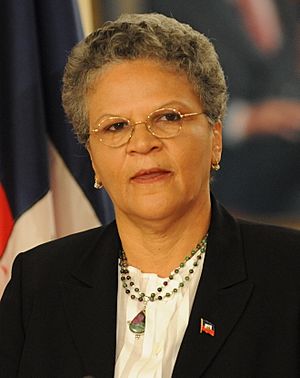Michèle Pierre-Louis facts for kids
Quick facts for kids
Michèle Pierre-Louis
|
|
|---|---|

Pierre-Louis in 2009
|
|
| 14th Prime Minister of Haiti | |
| In office 5 September 2008 – 11 November 2009 |
|
| President | René Préval |
| Preceded by | Jacques-Édouard Alexis |
| Succeeded by | Jean-Max Bellerive |
| Personal details | |
| Born | 5 October 1947 |
| Political party | Independent |
| Alma mater | City University of New York, Queens |
Michèle Duvivier Pierre-Louis (French pronunciation: [miʃɛl pjɛʁ lwi]; born 5 October 1947) is a politician from Haiti. She was the Prime Minister of Haiti from September 2008 to November 2009. She was the second woman to hold this important job in Haiti's history.
Contents
Michèle Pierre-Louis's Career Journey
Leading a Helping Organization
Before becoming Prime Minister, Michèle Pierre-Louis led an organization called the Knowledge and Freedom Foundation (FOKAL). This group helps people in Haiti. She started working there in 1995. FOKAL is a non-governmental organization, which means it works independently from the government.
Becoming Prime Minister of Haiti
In June 2008, President René Préval chose Michèle Pierre-Louis to be the new Prime Minister. Two other people had been suggested before her, but they were not approved.
Approval Process for Prime Minister
Her nomination needed to be approved by Haiti's lawmakers. The Chamber of Deputies approved her on 17 July 2008. Then, the Senate also approved her on 31 July.
Forming a New Government
President Préval announced the members of the new government on 25 August. Michèle Pierre-Louis became the Prime Minister. She also took on the role of Minister of Justice and Public Security. The new government was supposed to start on 26 August. However, this was delayed because of Hurricane Gustav.
Facing Challenges as Prime Minister
Michèle Pierre-Louis's plans for the government were approved on 5 September 2008. This happened after many talks with lawmakers. Her government started at a very difficult time for Haiti. The country was badly hit by Hurricane Hanna and Hurricane Ike. These storms caused a lot of damage and made her job even harder.
Recognized for Her Work
A well-known international magazine, The Economist, wrote about Michèle Pierre-Louis in 2010. They said that Haiti had a chance to improve its economy and politics under her leadership. The magazine noted her success in bringing different groups together in Haiti. They also mentioned her good relationships with international leaders, like former US president Bill Clinton. Many hoped her time as Prime Minister would help Haiti overcome poverty and social problems.
End of Her Term
After about a year, some senators from President Préval's party felt that people's lives were not getting better. While some disagreed, saying it was unfair to blame her for long-standing problems, Michèle Pierre-Louis and her government were voted out of office. This happened on 11 November 2009.
After Her Time in Office
After the terrible 2010 Haiti earthquake, Michèle Pierre-Louis shared her ideas for helping Haiti recover. She wrote an article for the Huffington Post. In it, she described a three-step plan for the country: rescue, recovery, and rebuilding.
Other Activities
- Open Society Foundations, Women’s Rights Program, Member of the Advisory Board
See also
 In Spanish: Michèle Pierre-Louis para niños
In Spanish: Michèle Pierre-Louis para niños
 | Victor J. Glover |
 | Yvonne Cagle |
 | Jeanette Epps |
 | Bernard A. Harris Jr. |

